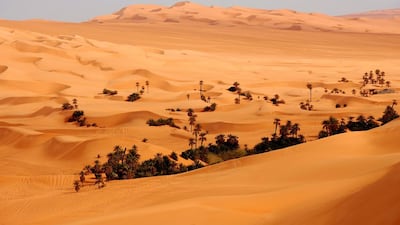The first omen comes in the form of a senile bird. The leader of the Tuareg tribe in Ibrahim Al Koni's novel New Waw: Saharan Oasis feels a kinship with the bird; he also doesn't want to migrate with his flock across the desert. He is done searching for Waw, "the lost oasis that he knew he would never find," and this poses something of a problem among his nomadic tribe.
The endless pursuit of the desert void – or that mythical land of plenty, Waw – is what sustains their way of life, their greater spiritual ethos. What will happen to a tribe that abandons the search?
Originally published in Arabic in 1999, New Waw is the first entry in a trilogy that traces a Saharan tribe's transition from nomadism to sedentary oasis life.
William Hutchins’s English translation, published last year, deservedly won the National Translation Award for prose last month. Its language is simple and the tone is delightfully cryptic.
For a novel that praises the wisdom to be found in madness, Hutchins’s translation of Koni’s prose is a lucid distillation of that madness – something that abounds in the book.
Following the leader’s death, some of the tribe’s members are pushed to the brink of insanity through encounters with the Spirit World.
A virgin bride married to the deceased leader in a post-mortem ceremony goes insane after spending a night in his tomb; a man obsessed with the earth sleeps deep in a hole in the ground; the tribe’s builder fashions every structure in the shape of a circle.
As the spiritual chasm within the tribe deepens, some of its members wander off into the abyss of the desert, never to be heard from again, while others exist in a limbo between divine revelation and insanity.
The rest of the tribe, meanwhile, must interpret the confusing prophecies they receive, like, “Never in the desert will glad tidings from heaven be heard unless the tomb’s stone drinks the crow’s blood.” (The tribe eventually decides that a crow is not a crow but a black goat. And they must sacrifice it. Or else.)
Koni, a prolific Tuareg author from Libya, provides little outside context, historical or otherwise, in telling the story of the tribe’s settlement, which they name New Waw.
Occasional phrases in Tamasheq, a Tuareg language, situate us among the Tuareg, and the title’s reference to the Sahara orients us somewhere in the desert expanses of North Africa. But the exact time period of described events is uncertain. As a result, the stories have the feel of a mythic lore.
Hutchins notes in his introduction that Koni is an expert in Tuareg folklore, and one of the most compelling aspects of New Waw is how he integrates this folklore with outside philosophies.
Quotes from thinkers like Carl Jung and Søren Kierkegaard precede each chapter, binding their ideas to the author’s own brand of desert mysticism.
To Koni, the desert in New Waw is a labyrinth, a secret, and it gives birth to a vivid cosmology. "In the desert we die in body but live in spirit," writes Koni in A Sleepless Eye, his 2014 collection of aphorisms.
The characters in New Waw – the Diviner, the Stranger, the Leader – are all fleeting actors in a more eternal story of the desert. The tribe's migration across the Sahara represents a submission to nothingness and temporality; their decision to settle is a reversal of that fate.
After the tribe digs a gushing well and develops their camp into a “burgeoning oasis,” the caravans begin to arrive and trade ensues.
For centuries, the only visitors to their camps had been flocks of birds and the occasional stranger. Now, the tribe constructs walls to delineate its territory and makes laws to determine who may settle in New Waw and who may not.
New Waw only hints at the struggles to come in the trilogy's other two books, The Puppet and The Scarecrow (the latter of which introduces a corrupt Muammar Qaddafi-like leader), but it does not bode well for the tribe. Their new settlement, after all, is built around their deceased leader's tomb.
Leah Caldwell writes for Alef Magazine, the Los Angeles Review of Books and the Texas Observer.

